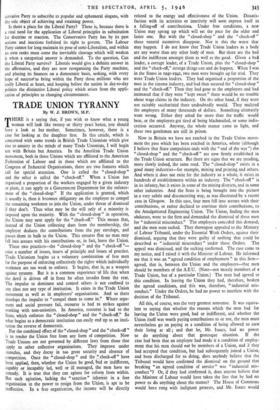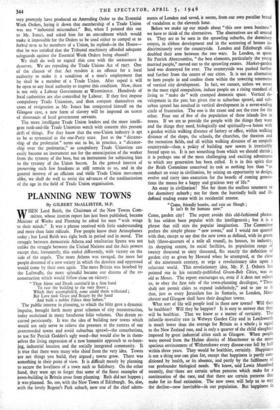TRADE UNION TYRANNY
By W. J. BROWN, M.P.
THERE is a saying that, if you wish to know what a young woman will look like twenty or thirty yeari hence, you should have a look at her mother. Sometimes, however, there is a case for looking at the daughter first. In this article, which is concerned with some trends in British Trade Unionism which give rise to anxiety in the minds of many Trade Unionists, I will begin not with Britain but America. In the 'Amen-tali Trade Union movement, both in those Unions which are affiliated to the American Federation of Labour and in those which are affiliated to the Congress of Industrial Organisations, there are two features which call for special attention. One is called the " closed-shop " and the other is called the "check-off." When a Union has organised a proportion of the workers engaged by a given industry or plant, it can apply to a Government Department for the enforce- ment of the " closed-shop." If the application is granted, which it usually is, then it becomes obligatory on the employer to compel the remaining workmen to join the Union, under threat of dismissal if they don't. Thus what may be the will only of a minority is imposed upon the majority. With the " closed-shop " in operation, the Union may next apply for the " check-off." This means that, instead of the Union collecting dues from the membership, the employer deducts the contributions from the pay envelope, and passes them in bulk to the Union. This ensures that no man may fall into arrears with his contributions or, in fact, leave the Union.
These two practices—the " closed-shop " and the " check-off "- raise a number of issues, issues of principle and issues of practice. Trade Unionism begins as a voluntary combination of free men for the purpose of enforcing collectively the rights which individually workmen are too weak to enforce. It begins, that is, as a weapon against tyranny. But it is a common experience 'of life that when the devil is driven off in front he often invades from the rear. The impulse to dominate and control others is not confined to any class nor any type of institution. It exists in the Trade Union movement as well as in employers' organisations. And so there develops the impulse to " compel them to come in." Where argu- ment and social pressure fail, recourse is had to strikes against working with non-unionists. In America, recourse 'is had to the State, which enforces the " closed-shop " and the " check-off." So what begins as a democratic institution can easily end- up as an insti- tution the reverse of democratic.
For the combined effect of the " closed-shop " and the " check-off " is to render the Union free from any form of competition. Now Trade Unions- are not governed by different laws from those that apply to other collective organisations. They improve under stimulus, and they decay in too great security and absence of competition. Once the " closed-shop " and the ..."check-off " have been applied, then, whether the Union be good, bad or indifferent, capably or incapably led, well or ill managed, the men have no remedy. It is true that they can agitate for reform from within. But such agitation, lacking the " sanction " injierent in a free organisation in the power to resign from the Union, is apt to be ineffective. In a free organisation, the income will be directly related to the energy and effectiveness of the Union. Dissatis- faction with its activities or inactivity will soon express itself in a falling-off of contributions. Under free conditions, a new Union may spring up which will set the pace for the older and lazier one. But with the " closed-shop " and the " check-off " these natural incentives disappear. Nor is this the worst that may happen. I do not know that Trade Union leaders as a body are any worse than any other body of men. But there are the bad and the indifferent amongst them as well as the good. Given a bad leader, a corrupt leader, of a Trade Union, plus the " closed-shop " and the "check-off," strange things can and do happen. When I was in the States in 1941-1942, two men were brought up for trial. They were Trade Union leaders. They had organised a proportion of the men in the cinema industry, and had then secured the " closed-shop " and the " check-off." Then they had gone to the employers and had intimated that if they were "kept sweet" there would be no trouble about wage claims in the industry. On th.: other hand, if they were not suitably saccharined there undoubtedly would. They mulcted the employers of many thousands of dollars. Something ultimately went wrong. Either they asked for more than the traffic would bear, or the employers got tired of being blackmailed, or some indis- cretion occurred. Anyway, the whole matter came to light, and these two gentlemen are still in prison.
Now in Britain we have not reached in the Trade Union move- ment the pass which has been reached in America, where (although I believe that State compulsion ends with the " end of the war") the " closed-shop " and the "check-off " are now firmly established in the Trade Union structure. But there are signs that we are treading, more slowly indeed, the same road. The " closed-shop " exists in a good many industries—for example, mining and printing and others. And where it does not exist for the industry as a whole, it exists in hundreds of establishments within an industry. The "check-off " is in its infancy, but it exists in some of the mining districts, and in some other industries. And the State is being brought into the picture in a very subtle and disconcerting way, as was illustrated by a recent case in Glasgow. In this case, four men fell into arrears with their contributions, or rather declined to continue their contributions, to the Amalgamated Engineering Union. The Union, finding the men obdurate, went to the firm and demanded the dismissal of these men for "industrial misconduct." The employers conceded this demand, and the men were sacked. They thereupon appealed to the Ministry of Labour Tribunal, under the Essential Work Orders, against their dismissal, arguing that they were guilty of nothing that could be described as " industrial misconduct " under those Orders. The appeal was dismissed, and the sacking confirmed. The case came to my notice, and I raised it with the Minister of Labour. He informed me that it was an " agreed condition of employment " in this firm— agreed, that is, between the Union and the employers—that men should be members of the A.E.U. (Note—not merely members of a Trade Union, but of a particular Union.) The men had agreed to this condition. In leaving the Union they had, therefore, broken the agreed conditions, and this was, therefore, " industrial mis- conduct." Under the Orders, he had no power to interfere with the decision of the Tribunal.
All this, of course, was the very greatest nonsense. It was equiva- lent to saying that whether the reasons which the men had for leaving the Union were good, bad or indifferent, and whether the Union itself was worth paying contributions to or not, the men must nevertheless go on paying as a condition of being allowed to earn their living at all ; and that he, Mr. Isaacs, had no power to do anything about that grotesque situation. If the case had been that an employer had made it a condition of employ- ment that his men should not be members of a Union, and if they had accepted that condition, but had subsequently joined a Union, and been discharged for so doing, does anybody believe that the Tribunal would have confirmed the dismissal' on the ground that breaking " an agreed condition of service " was " industrial mis- conduct "? Or, if they had confirmed it, does anyone believe that the Minister of Labour would have taken the line that he had no power to do anything about the matter? The House of Commons would have rung with indignant protests, and Mr. Isaacs would very promptly have produced an Amending Order to the Essential Work Orders, laying it down that membership of a Trade Union was not " industrial misconduct." But, when I pointed this out to Mi. Isaacs, and asked him for an amendment which would make it impossible for the Orders to be used either to compel or to forbid mPn to be members of a Union, he replied—in the House— that he was satisfied that the Tribunal machinery afforded adequate safeguards against the Essential Work Orders being abused!
We shall do well to regard this case with the seriousness it deserves. We are repealing the Trade Unions Act of 1927. One of the clauses of that Act renders it an offence for a local authority to make it a condition of a man's employment that he shall be a member of a Trade Union. After repeal it will be open to any local authority to impose this condition. Now, there is not only a Labour Government at Westminster. Hundreds of local ranhorities are also controlled by Labour. If they first impose compulsory Trade Unionism, and then comport themselves on cases of resignation as Mr. Isaacs has comported himself on the Glasgow case, a new form of slavery will be imposed on scores of thousands of local government servants.
The more intelligent Trade Union leaders and the more intelli- gent rank-and-file Trade Unionists watch with concern this present drift of things. For they know that the one-Union industry is apt to be as tyrannical as the one-Party state. Just as the " dictator- ship of the proletariat " turns out to be, in practice, a " dictator- ship over the proletariat," so compulsory Trade Unionism can easily become an instrument not for the emancipation of the worker from the tyranny of the boss, but an instrument for subjecting him to the tyranny of the Union bosses. In the general interest of preserving such few freedoms as still remain to us, and in the general interest of an efficient and virile Trade Union movement alike, we shall do well to resist the advances of the totalitarianism of the age in the field of Trade Union organisation.































 Previous page
Previous page